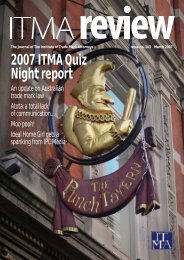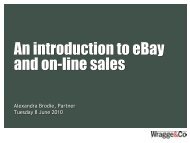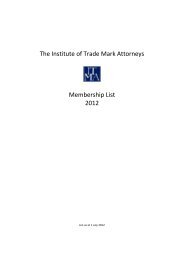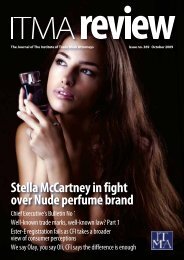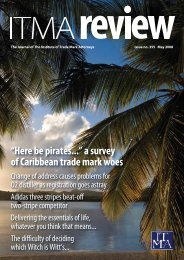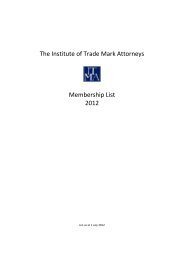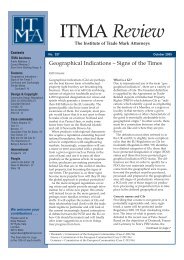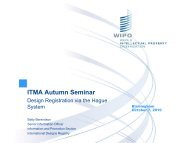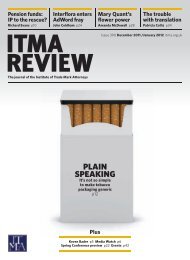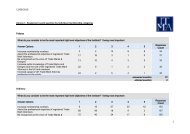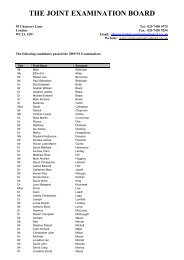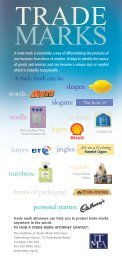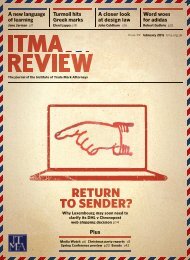ITMA 322 APRIL 2005
ITMA 322 APRIL 2005
ITMA 322 APRIL 2005
You also want an ePaper? Increase the reach of your titles
YUMPU automatically turns print PDFs into web optimized ePapers that Google loves.
<strong>ITMA</strong> BUSINESS<br />
and Mrs Ramage gave a talk on behalf of the Institute.<br />
The event was very well attended with around 120<br />
people present.<br />
Continuing Professional Development<br />
CPD Accreditation: The Committee had agreed that it<br />
should be made quite clear to bodies who asked for<br />
<strong>ITMA</strong> CPD accreditation that they could only state in<br />
their literature that the event was ‘accredited by <strong>ITMA</strong>’,<br />
rather than sponsored or supported by <strong>ITMA</strong>.<br />
<strong>ITMA</strong> Review Committee<br />
It was reported that there had been a problem with the<br />
quality of the photos featured in the July/August edition<br />
of the <strong>ITMA</strong> Review and this was due to a change<br />
in the resolution of the images. A reassurance was<br />
given by the printer that this would not happen again.<br />
Redesign of the <strong>ITMA</strong> Review: The Committee were considering<br />
a re-design of the <strong>ITMA</strong> Review in conjunction<br />
with the re-design of the <strong>ITMA</strong> website and it was<br />
hoped this might include more colour.<br />
Programme Committee<br />
Autumn Conference <strong>2005</strong>: The conference had taken<br />
place on 29 and 30 September in Barcelona and had<br />
Nation as Brand – the ultimate IP Challenge?<br />
Seminar Review<br />
On 31 October, there was a lunchtime seminar at the<br />
Intellectual Property Research Institute at Queen Mary,<br />
University of London. The speaker was Simon Anholt,<br />
the author of a number of books on the branding of a<br />
nation (for further information, see www.earthspeak.com).<br />
He considered what is not a brand first. It is not one<br />
of the tools of marketing such as advertising, or a logo.<br />
It is more than externally visible factors. It is not just a<br />
sense of common purpose. It is a complex concept. It<br />
could be described as “the perception in the minds of<br />
people in the market place”.<br />
Simon gave numerous examples of good and bad<br />
brands and why efforts by those brands to improve<br />
their market perception may have failed. These examples<br />
reinforced his view that brand is not the message<br />
but the context in which it is received. It is “the fertile<br />
soil or the stony ground”, is how he put it, and is<br />
formed by an uncountable number of factors. That is<br />
what makes it so complex.<br />
Imagine that instead of creating a brand for a tin of<br />
beans, these factors are applied to create a brand for a<br />
nation? Can all of the factors apply or are only some<br />
aspects scalable?<br />
Why brand a country in the first place? By giving<br />
numerous anecdotal examples, Simon filled in his talk<br />
like a painting, applying texture and colour as he went.<br />
Starting with the little village of Scratbury in Norfolk<br />
and its unique identity and where this comes from,<br />
Simon developed the ideas which could equally apply<br />
to Ethiopia, Nigeria, Turkey and Mongolia, to name a<br />
few of the destinations mentioned.<br />
Whilst is it possible to see the direction of this particular<br />
“supertanker” (the subject is vast and its implications<br />
and effects of such scale that I could sense the<br />
been a great success. The Committee had received very<br />
positive feedback on the event which had made a small<br />
profit.<br />
OHIM Seminar: The Committee were liasing with<br />
OHIM over holding a day-long seminar later on in<br />
2006. This was thought to be great news as OHIM were<br />
becoming more approachable.<br />
Registry Seminars<br />
Four half-day seminars would take place in January<br />
2006 which would see Mike Knight of the Registry discussing<br />
respective opposition systems. The seminars<br />
would travel to four locations round the country.<br />
Christmas Lunch: Flyers had gone out advertising the<br />
London and Northern Christmas Lunches.<br />
Formalities Committee<br />
Everything was running smoothly in terms of the<br />
preparation for the courses in Jersey and London in<br />
2006. A new course would be run in Birmingham.<br />
Internet Committee<br />
Council would consider registering ‘www.itma.eu’ as a<br />
domain name.<br />
supertanker analogy bubbling to my own linguistic<br />
surface), it is also easy to see how it must take hours to<br />
slow down or turn. So too must a nation have a longterm<br />
outlook; difficult in this fickle world.<br />
Another interesting thread, worthy of far more discussion<br />
than the time allowed, revealed itself as the<br />
conflict which arises between different entities within<br />
the nation wanting the new brand. For example, the<br />
tourist board, which often has great marketing purchasing<br />
power, would like a view of the nation which<br />
lends itself to tourism. This frequently conflicts with<br />
the nation view the business community would like.<br />
Simon gave Scotland as an example of this. The tourist<br />
board spends a large sum of money enhancing the<br />
view people have of Scotland as 150 years behind the<br />
times: few roads, rural and relaxing; whereas it is a<br />
modern country and the B2B contingent want to get<br />
over an image of modernity and economic success so<br />
as to attract investors.<br />
Full of realism, it is hard to disagree too strongly<br />
with the view that perceptions of countries and the<br />
people in them are often justified. It is for the nation<br />
itself and the people in it to work with their good qualities<br />
to create the brand for their nation and<br />
people which they know is true and which they can<br />
sustain at an international level. Only then will the<br />
branding nation have something to shout about.<br />
How does all this interact with pure IP in terms of<br />
protection and exploitation — well there was not<br />
enough time to cover that. Perhaps a Branding Nations<br />
2 is in order? I would highly recommend it.<br />
The seminar programme for the IPI at Queen Mary<br />
can be seen at http://www.ccls.edu/events/<br />
Amanda Maclachlan, Allen & Overy LLP<br />
December <strong>2005</strong> <strong>ITMA</strong> Review 7



